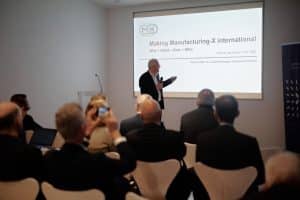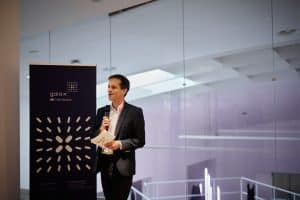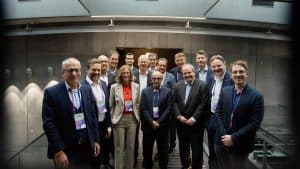At the invitation of the Platform Industry 4.0 Austria and the Gaia-X Hub Austria, representatives of the European Manufacturing-X initiative met in Vienna on September 13 as part of the Technology Talks Austria 2024. The aim of the event was to discuss the current digitalization approaches for creating data spaces in industry.
In the global economy, it is not just individual companies that are competing with each other, but entire regions and industrial ecosystems. Cooperation in value creation networks is therefore the order of the day – cross-company collaboration is playing an increasingly important role in digitalization in particular. Austrian industrial companies are taking on a pioneering role in digitalization.
Major European projects for sustainable data sovereignty against lock-in effects as a basis for global competitiveness
There are numerous approaches in Europe to promote data-based collaboration. Dominik Rohrmus from Siemens and the German Lab Network Industry 4.0 is involved in a flagship project of the Manufacturing-X initiative. This initiative is driving forward industrial projects from Germany that are intended to serve as global lighthouse projects for handling production data in various sectors – such as aviation or the semiconductor industry. The focus here is on decentralized, federated IT approaches as well as interoperable and open source technologies in order to avoid dependencies on individual IT companies.

The European Commission also supports initiatives for data exchange and the development of data spaces. Solutions for production are being developed as part of the SM4RTENANCE project, one of 14 “Common European Dataspaces”. Led by Oscar Lazaro from the Spanish research company Innovalia, the aim is to implement projects that make the currently unused 80% of industrial data in various sectors – such as the electronics, textile and automotive industries – usable. A key objective is to ensure interoperability with other European initiatives, in particular Manufacturing-X.
Standardization and pragmatism as necessary ingredients
If you want IT architectures to be interoperable, this requires standardization. Jens Gayko from the German Standardization Council Industrie 4.0 is one of the advocates of the latter. European IT standardization is currently working on the Digital Product Passport, for example, which will become mandatory for many product groups in the coming years as a result of the EU’s new Ecodesign Regulation. In order to implement such complex regulations efficiently, the industry needs standardized technical infrastructures and reusable components. It is important not to reinvent the wheel, but to build on common standards, e.g. for data spaces.
John Blankendaal from Brainport Industries in the Netherlands also calls for a pragmatic approach. The high-tech industry is deeply rooted in Europe with companies such as ASML. At the same time, high-tech products can only be manufactured via complex value creation networks. These existing structures also need to be digitally networked.
Projects in France, Germany and Austria
The shared vision of networked value chains in production links research projects throughout Europe. In France, Data4Industry-X is a project in which Jean Pascal Riss from automation company Schneider Electric is involved. The aim is to move from individual solutions in a single factory of a single company to collaborative approaches for several factories of different companies.
Probably the best-known German project with a similar approach is Catena-X, which focuses on the automotive industry. Catena-X has already been completed as a research project, but the project is being further developed in an association headed by Anja Misselbeck. Current use cases include traceability in vehicle production, calculation of the CO2 footprint and the battery passport. A joint software stack forms the basis for the applications and is being further developed as open source software.
This software stack is also used in Manufacturing-X, e.g. in mechanical engineering in the Factory-X project. Sebastian Schneider from DMG MORI and Ingo Sawilla from TRUMPF are working on the digitalization of “factory equipment”. The aim is to digitally map the life cycle of a machine and make it easier for companies in mechanical engineering or automation to provide digital services.
Bernhard Peischl from AVL is also concerned with the data-driven improvement of the company’s own products, from engineering to use. In Graz, industrial applications are seen as drivers for the implementation of data spaces. Applications include, for example, the prediction of faults in cars with the help of usage data or the use of trustworthy artificial intelligence in product design.
Austria’s position around Gaia-X and Manufacturing-X
The Gaia-X Hub Austria, which hosted the event as part of the Technology Talks Austria, is one of the organizations in Austria that deals with the consistency of data. Helmut Leopold from the AIT Austrian Institute of Technology heads its Management Board: “We not only support initiatives such as Gaia-X or Manufacturing-X in research projects with industry. We are also actively involved in transnational working groups and act as a bridge builder in Austria and Europe. In this way, we want to support Austrian industry in actively participating in the emerging data ecosystems. We are delighted that we were able to use Technology Talks Austria 2024 for this purpose.“

The digital transformation of the Austrian manufacturing ecosystem is the goal of the Platform Industry 4.0, which was founded in 2015 and organized the special event. For its Managing Director Roland Sommer, standardization is particularly important: “We want to avoid isolated solutions and focus on European and global cooperation, especially when it comes to the future topic of data exchange. Through the International Manufacturing-X Council, which drives coordination processes for the further development of Manufacturing-X at a global level, or projects such as SM4RTENANCE and CIRPASS, we are contributing the Austrian perspective to international lighthouse projects.“

Michael Fälbl from Platform Industry 4.0 Austria adds: “Global standards are highly relevant for our export-oriented industry with its many ‘hidden champions’. It is not only our goal to keep Austrian companies continuously informed about relevant developments. We also support the industry in linking up with international projects and initiatives.”
We would like to thank all speakers, participants and supporters and especially the AIT Austria Institute of Technology for making the event possible!

